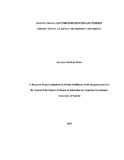| dc.description.abstract | Provision of facilities and materials plus establishment of teaching staff are very key in ensuring a university lecturers productivity. There is need to assess top management’s provision of these facilities. This study aimed at establishing the institutional factors influencing lecturers’ productivity at Kenya Methodist University (KeMU). The research objectives for the study were :to examine how the top management’s provision of physical facilities, office space, library facilities, establishment of the academic staff and opportunities for personal growth and development influences lecturers’ productivity. The results of this study provide useful data on factors influencing lecturers’ productivity. As KeMU strives to be the University of Choice due to its excellence in ensuring quality through lecturers’ productivity, the study provides guidance to the top management in decision making on provision of the institutional factors influencing lecturers’ productivity. This study was anchored on Herzberg’s Two Factor theory also known as Motivation-Hygiene theory. The study employed descriptive survey design, census and simple random sampling in selecting the sample of lecturers and students respectively from KeMU, Nairobi Campus. The target population was all full time lecturers at KeMU Nairobi campus and students in the School of Business and the school of Computing and Informatics at KeMU, Nairobi Campus. 10% of the total population was used to calculate the targeted sample. The sample size was 97 lecturers and 162 students. The researcher used questionnaires with open and closed ended questions as the main tool for data collection. There were two questionnaires: One for the lecturers and the other one for the students. Data collected was coded, cleaned, categorized and processed using Statistical Package for Social Sciences (SPSS). The findings of the study suggest that top management has provided most of the physical facilities for the lecturers. However, office space for students mentoring and guidance as well as lecturers office sharing were not adequate. The same applied for lecturers’ research/study room. In addition, the findings showed that the majority of lecturers (65.8%) disagreed on existence of progressive periodic salary increment and a majority of them (56%) did not agree to availability of in-house skills training. The study recommends that the university’s management puts measures in place to provide appropriate office sharing which will translate to more space for mentoring and guidance. The top management also needs to create more time for the lecturers through reducing their work-load. This can be achieved through employing more lecturers and proper distribution of the administrative jobs. The study also recommends increased provision and use of modern teaching tools so as to enhance more learning and productivity. Finally and of importance, the study recommends a revamp of the motivational factors available in the university. | en_US |



